Tea is something I drink every single day. It’s sacred at my house – I even have a whole drawer devoted to it! I drink it because it is amazing for your health. There are so many varieties of tea that can improve digestion, metabolism and even prevent certain diseases. This investigation into tea ingredients has been in the making for a long time. What I’m about to share with you totally rocked my world forever and I’ll never look at tea in the same way again. Do you really want to know what’s in your tea?…Then read on.
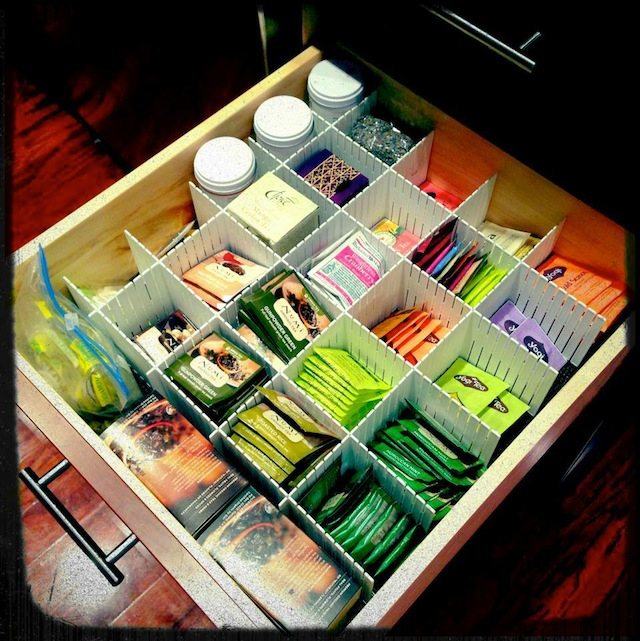 The ancient Chinese tradition of drinking tea dates back thousand of years to the early Chinese dynasties and aristocrats who drank the beverage for its medicinal properties. In ancient times, leaves from the Camellia Sinensis (the tea plant) were either ground into a powder or placed as loose leaves directly into water to infuse it with herbal essence. Unfortunately, modern day tea is nothing like the unadulterated version of old tea. Many of today’s tea brands are operating under the guise of providing health benefits and promoting clean living, but are actually laden with pesticides, toxins, artificial ingredients, added flavors and GMOs.
The ancient Chinese tradition of drinking tea dates back thousand of years to the early Chinese dynasties and aristocrats who drank the beverage for its medicinal properties. In ancient times, leaves from the Camellia Sinensis (the tea plant) were either ground into a powder or placed as loose leaves directly into water to infuse it with herbal essence. Unfortunately, modern day tea is nothing like the unadulterated version of old tea. Many of today’s tea brands are operating under the guise of providing health benefits and promoting clean living, but are actually laden with pesticides, toxins, artificial ingredients, added flavors and GMOs.
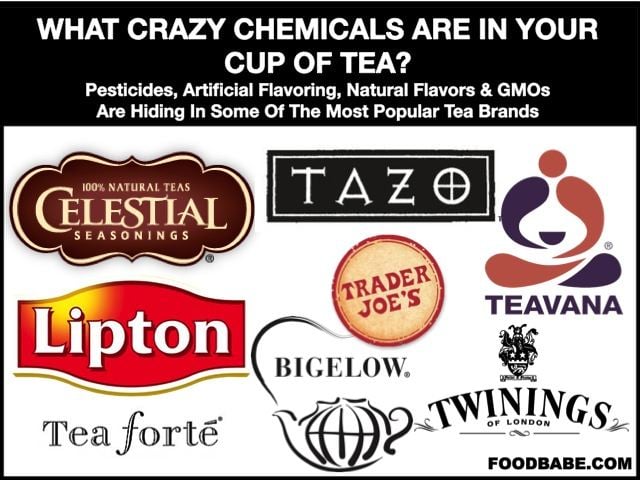
Conventional Teas – An Abundance of Pesticides
Did you know that most tea is not washed before it is put it into bags? That means if the tea was sprayed with cancer-causing pesticides, those pesticides go directly into your cup. And this is the reason why tea is on my organic shopping priority list. To prove this point, here are some shocking facts about one of the most well-known tea brands – Celestial Seasonings.
A recent third-party analysis by Glaucus Research and discussed here found that 91 percent of Celestial Seasonings tea tested had pesticide residues exceeding the U.S. limits. For example, Sleepytime Kids Goodnight Grape Herbal contained 0.26 ppm of propachlor, which is a known carcinogen under California’s Propsition 65.
The “Wellness” tea line was found to contain traces of propargite, also a known carcinogen and developmental toxin. The FDA has already issued two warning letters to Celestial Seasonings in regard to poor quality control according to this source. Imagine what happens when pesticide-laden tea is steeped in boiling water.
If grocery store brands don’t provide a clean option for you, perhaps a high-end loose leaf tea would circumvent some of the issues of grocery store brands. Right? Wrong! Take Teavana, which is found in malls across North America for example. Teavana taps into tea culture with the “Teavana Experience.” Convincing their employees to take customers on a sensory journey – they open a huge canister of loose leaf tea and wave the top of the canister so you can smell the tea – touting all of the wonderful health benefits of tea complete with samples and manipulative demonstrations that end in an expensive visit to the tea shop. Is all the extra money worth it? Are customers getting a superior tea product? No.
Teavana tea was tested by an independent lab and 100 percent of it was found to contain pesticides. One tea in particular, Monkey Picked Oolong, contained 23 pesticides. 77 percent of the teas would fail European Union pesticide import standards, and would be banned from import. 62 percent of the teas tested contained traces of endosulfan, a pesticide that has been banned by the U.S., China, the E.U., and 144 other countries because it has been linked to impaired fertility and could harm unborn babies.
UPDATE (May 27, 2014): Glaucus Research funded the research done by Eurofins Scientific (an independent lab) and admits on their disclaimer that they are biased because they would make money if Hain’s stock declines. However – I am not sure that Eurofins’ research should be completely discounted on this point alone. Since I wrote this post, Celestial has been sued in a class-action lawsuit based on the pesticides that Eurofins found in their teas and for mislabeling of them as “100% Natural”. The jury is still out on whether Eurofins’ research will be considered legit, as this case is still active in California. The Plaintiffs contend that Celestial’s teas contain “pesticides, herbicides, insecticides, carcinogens, and/or developmental toxins (collectively, “Contaminants”)” and Celestial “did not dispute – and has never disputed – that the tea Products contained Contaminants. Nor has (Celestial) challenged the results of the Eurofins Tests” and “has not claimed that Eurofins was biased or that the Eurofins Tests were not, in fact, accurate”. Even if it is determined that Eurofins’ research was not accurate – it’s important to note that Celestial’s tea that was tested is NOT organic and some of this tea is sourced from China. Greenpeace issued a report on the alarming amount of pesticides found on tea from China, followed up by a detailed report on Lipton brand tea from China – in which they recommend only purchasing certified organic tea to avoid these pesticides. Reference law documents: Complaint; Plaintiff’s Memo in Opposition to Motion to Dismiss. Case 8:13-cv-01757-AG-AN
Teas Can Contain Artificial Flavoring, Natural Flavors, and Hidden GMOs
Furthermore, a majority of Teavana teas contain added flavor – specifically “artificial flavoring.” If their tea is so high end, why would they be adding ingredients produced by fractional distillation and chemical manipulation of various chemicals like crude oil or coal tar? Coal tar in my tea? No, thanks.
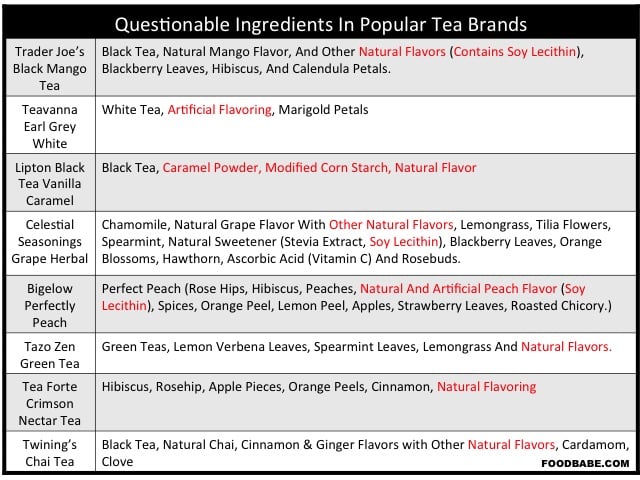
Many popular tea brands get away with using the ingredient “natural flavors” to trick the consumer into thinking they are buying better, cleaner ingredients; however companies are just covering up the inferior taste and low quality of their tea. Fortunately, there are brands that are putting the kibash on the use of natural flavors and using all real ingredients. I was happy to learn that Ahmed Rahim, CEO of Numi Tea is just as disgusted by this ingredient as I am. He said to me “You can breakdown anything that is found in nature and if it ends up tasting like the flavor you wish to use – you can add it to any product and call it NATURAL FLAVOR on the ingredient label. It could come from a stone in the ground and you’d never know.” This is why when I see the words “natural flavor” listed on a label – I put the product down and run far far away. I want to know what I am eating! Don’t you?
Additionally, the added risk of consuming possible GMOs is not something many people think about when consuming teas. Before this investigation and witnessing tea companies using modified corn starch and soy lecithin in tea (additives likely made from genetically engineered corn and soy), I didn’t think about it either! I can’t imagine having a serious soy allergy, considering all the places companies try to hide it.
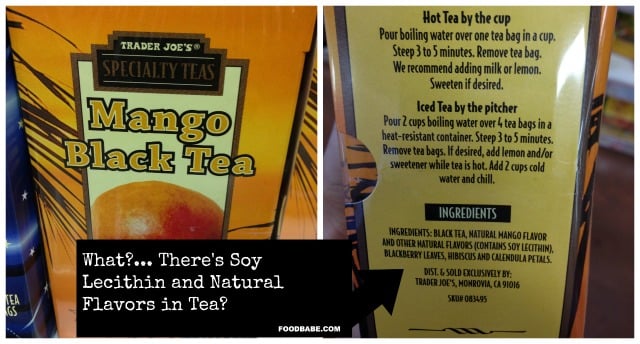
Why The Tea Bag & Packaging Matters
A recent article in The Atlantic discusses the “silky sachet” and “luxurious mesh bags” that hold loose leaf teas (like in brands Tea Forte and Mighty Leaf). Turns out, these modern day bags meant to showcase the tea leaves, are made of plastic.
PLA (polylactic acid) is a (likely GMO) corn-based tea bag material that has attracted major tea companies due to its nice look and its claims of biodegradability. Terms like “silky sachets” and “corn-based biodegradable tea bags” mislead customers into believing a product is more natural and sustainable than it really is. While the processing for PLA removes all traces of genetic material, it is still made with genetically modified corn. Although the actual tea bag is not an ingredient like teas and herbs, it is an element that is put into boiling water.
According to The Atlantic, tea bags are most commonly made from food grade nylon or polyethylene terephthalate (PET) which are two of what’s considered the safest plastics on the scale of harmful leaching potential. However, Dr. Mercola disagrees, he states:
“While these plastics are generally considered among the safest in terms of leaching potential, the molecules in these plastic tea bags may still in fact break down and leach out when steeped in boiling water…” Well, isn’t that how tea is prepared?
Another temperature consumers need to worry about in tea is the “glass transition” temperature. Here’s the science behind the glass transition temperature or, Tg, and why it becomes dangerous according to The Atlantic:
“That is the temperature at which the molecule in certain materials such as polymers begin to break down. As a rule, the Tg of a material is always lower than the melting point. In the case of PET and food grade nylon (either nylon 6 or nylon 6-6), all have a Tg lower than the temperature of boiling water. For example, while the melting point of PET is 482 degrees Fahrenheit, the Tg is about 169 degrees. Both nylons have a lower glass transition temperature than PET. (Remember that water boils at 212 degrees.) This means the molecules that make up these plastic tea bags begin to break down in hot water.”
So, while the plastic itself won’t melt in your tea, the glass transition temperature could potentially leak out harmful phthalates if there are such things in your tea. Another thing to worry about is that some of the newer tea bags are made with a variety of plastics. Some plastics are nylon, some are made of viscose rayon, and others are made of thermoplastic, PVC or polypropylene.
Beware of paper tea bags too, which can be worse than plastic tea bags.
GET THIS: Also according to Dr. Mercola, many “paper tea bags are treated with epichlorohydrin, a compound mainly used in the production of epoxy resins. Considered a potential carcinogen by the National Institute for Occupational Safety and Health2 (NIOSH), epichlorohydrin is also used as a pesticide. When epichlorohydrin comes in contact with water, it hydrolyzes to 3-MCPD, which has been shown to cause cancer in animals. It has also been implicated in infertility (it has a spermatoxic effect in male rats) and suppressed immune function.”
So what do you do the next time you want a cup of tea? Antioxidant rich teas aren’t going to do much to counterbalance the chemicals, additives and artificial flavorings in today’s modern teas.
First, I recommend looking at this chart below to see how your favorite tea brand stacks up:
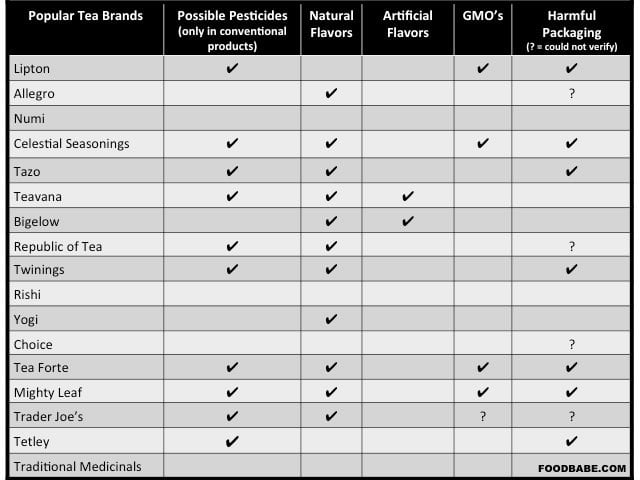
And then when brewing and picking out the safest tea remember these tips:
1. Choose an organic & non-GMO certified brand of tea. (My favorites are Numi, Traditional Medicinals, and Rishi Tea (loose leaf)).
2. Check the ingredient list on the back of the tea package to make sure there are no added flavors, GMO ingredients like soy lecithin and corn starch added to the tea leaves.
3. Make sure the brand you buy uses a safe form of packaging material or buy loose leaf tea and use a stainless steel or glass tea strainer. Have the company verify that bags do not contain epichlorophydrin, and avoid plastic tea bags all together. (Numi and Traditional Medicinals are some of the only brands I trust in this category because they have publicly stated they do not use this harmful ingredient or GMO packaging and are Non-GMO Project verified.)
4. The majority of restaurants use some of the most pesticide ridden tea and brands that have harmful packaging like Celestial Seasonings, Lipton, etc. Don’t fall victim to this. Bring your own tea when eating out or going to restaurants and ask for pot or cup of boiling water (remember to leave a good tip if you do this). I even do this at Starbucks because I like to vote with my dollars and not buy tea brands that are harmful. If you drink iced tea, brew your own at home and carry an insulated water bottle with you.
5. Remember these temps and times for brewing the perfect cup of tea
If you know someone who loves to drink tea, please share this post with them. I was just as shocked as you probably are about all of this craziness – knowing what’s in our tea and what we put in our body matters! Let’s change the world together.
Xo,
Vani


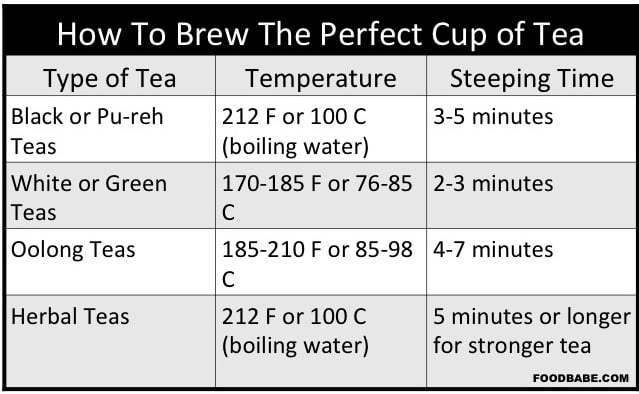


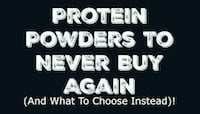



I am so glad I just read this. I was just about to take my nice teavana canister back to the mall for a refill. I feel so duped to be out the $50 + bucks I spent that got me hooked !!!
Bummer, I love Yogi Brand too! I just purchase teas by a Herbalist and a BPA FRE tea traveler, best investment of this month for my health. Check out tbysarah.com, met her while traveling in Cleveland, OH a few weeks ago. Her teas are amazing!
I love Yogi brand too! ‘worry not- I just went through my supply and threw away some Yogi teas that had the questionable flavorings added, however, some of the varieties were strictly ONLY organic ingredients! 🙂
You might want to read all the comments on the post, someone posted a reply from Yogi to these allegations.
What about loose leaf Frontier tea? It is one of my favorites. Really sad about Mighty Leaf because I like their tea.
I like Frontier teas as well and have gotten several one pound bags of whole herbs and teas from them. As they are organic and loose leaf with no additives, they are good quality and would not be on the evil list. Davidsons also has pretty good organic teas. It’s all about using whole herbs and straining them without the use of chemical laden filters. As Vani said, a metal or glass tea strainer are best. So glad this has finally been exposed!
We drink Luzianne in our home. There’s nothing on the label but orange peoke and peoke cut black tea. So, unless they’re not even fessing up to “natural flavors” and putting it on the package, this is straight tea. http://www.luzianne.com/shop/48ct_bagged_tea_iced_nutrition.png
Now, the packaging? I don’t know about the materials, but at least the tea is straight.
I hope Luzianne is ok too! I drink the decaf green tea like it’s going out of style!
.. great info for this newly converted tea-totaler. I’m also curious the source of the white plastic (?) drawer organizer used in the image of your tea drawer. shooting me an email is cool.
Possibly these?
http://www.amazon.com/Plastic-Storage-Cabinet-Divider-Partition/dp/B009FM5VQM/ref=sr_1_10?ie=UTF8&qid=1377115158&sr=8-10&keywords=plastic+drawer+dividers
I buy my tea from Adagio, but to be truthful, I’m not sure if that’s good or bad. Shocking to read that about Celestial Seasonings!
I’m curious, what about Tetley and Stash teas, how do you find out? Are there other safe brands? We drink tea every day!
Tetley definitely has pesticides, and questionable packaging. Stash, I believe uses Natural Flavors. There are so many brands out there – it would be tough to investigation all of them!
People always thank military people for there service. I have made it a point to ALSO thank people like you who work very hard at trying to make this a safer and healthier world. Thank You for your service Food Babe
Food Babe: Thank you for the article. I drink decaf tea and coffee. About a year ago I found out that the decaffeination processes use chemicals. I found that the best decaffeination process is the Co2 process. So I started buying Stash Organic premium decaf tea which is decaffeinated using that process. But now I am wondering that if the tea is required to be organic does that mean that the bag it is in is also organic? That would be crazy if you pay more for the organic tea and the bag that you steep it in is full of chemicals!
Thanks!
Food Babe: Thank you for the article. I drink decaf tea and coffee. About a year ago I found out that the decaffeination processes use chemicals. I found that the best decaffeination process is the Co2 process. So I started buying Stash Organic premium decaf tea which is decaffeinated using that process. But now I am wondering that if the tea is required to be organic does that mean that the bag it is in is also organic?
I buy my teas from Adagio, but — truth be told — I don’t know if that’s good or bad. I always buy loose leaf. Shocking to read that about Celestial Seasonings!
Where did you get the organizer for your drawer??? I have been trying to look for a way to organize my teas forever!
At the container store – really cheap too 🙂 I was so mad, I didn’t do this years ago!
I love Numi…it is the only tea I drink 🙂 yay!
I feel like the pesticides in these teas are even worse because they are steeped in the water. I only drink Traditional Medicinals mothers milk tea and Numi Organics green tea. Sometimes I make a cup of tea with fresh ingredients such as ginger, honey, or herbs from our garden.
Great investigation, Food babe!
Noooo! Yogi is my favorite! I really do love their inspirational quotes on each bag. I guess I’ll be finding those elsewhere. 😐
Some of the Yogi teas are 100% organic ingredients. Those varieties also have the USDA ORGANIC seal on the box. I was happy that I didn’t have to throw away ALL my Yogi teas… 🙂
Thank goodness! I will also have to try this Numi that you like so much. All of your research is very much appreciated!
Yogi is my favorite too-I LOVE the ginger tea-(and look forward to the quotes on the tags)-any suggestions for a replacement?
I just got confirmation they don’t use any harmful packaging and since the ginger is organic – you should be good to go!
Thank you for following up-I am SO happy- I must drink 2 cup a day of their tea! I hope you will update your article to clear that up for others-
This article is very eye opening as I’ve always assumed that all teas were healthy. Now, I’m not sure what to do with these boxes of teas that I have bought on sale.
Do you have any information on David’s Tea brand?
Great article! I just wrote about bottled iced tea and all of the nasty chemicals and natural flavors they contain – http://deceptivefood.com/is-bottled-iced-tea-good-for-you/
I always use organic numi tea to brew at home, love that stuff!
Any opinion of Equal Exchange teas?
Thank you for pointing this out. I try to purchase fair trade, organic, small company food products always. The way the workers are treated is equally as important as the ingredients.
Fair trade workers are more likely to work and pick with a positive attitude (as opposed to helplessness), thus influencing the overall goodness of a product. They also have access to health care, sick leave, etc. so they are less likely to spread disease on the product. The work conditions around the world for those who pick tea is mostly at surf/slave levels.
I drink fair trade, organic, green, unsmoked loose leaf yerba mate. Currently I purchase this through Ecoteas, a fair trade, organic company. You can go to their website to see how their teas are produced.
I am a huge health advocate, but after seeing a recent study that even polar bears have high amounts of PFAAs (perfluoroalkyl and polyfluoroalkly substances found in manufacturing products) in their brains (which means they are crossing the blood brain barrier) (Greaves, Letcher, Sonne, & Dietz, 2013), I am starting to worry that nothing is going to be safe in the future. We need more people speaking up about these things before it is too late and there is no turning back. What happens when even our most trusted companies can’t even avoid these harmful substances because it has just infiltrated the environment to the extent of no avoidance. Thank you for your continued hard work. I do believe there can be power in numbers and knowledge is power.
Ain’t it the truth? 🙁 I don’t know what IS safe anymore….
I only drink organic tea here. When i go back to France, I stock up from a very well know and fancy tea store call Mariage Freres. Best tea i have ever tasted. I think they sell online as well. Their tea menu is a book. they have tea from all over the world. Delicious. But here I will go all organic so i dont drink pesticide juice…
Isn’t it sad that the standards in the US are so much lower than those in Europe?
Anyone know about the purity Zhena’s tea bags?
I’m so upset about this!! I’m a huge tea drinker 🙁 Thank you, Vani for opening my eyes about these kind of things.
Thank you for this article on Tea ingredients. I found myself reading it as I read my morning tea and now am wondering about my brand. Can you tell me if in your research you looked at the brand guayaki yerba mate. They are an organic certified, non GMO verified, fair trade brand how ever I never considered the bags! I went to their site and no where can I find the ingredients/products list they use for their bags. Can you please tell me if you have researched this brand? Thank you.
Good article thank you!
From where is your research on Yogi Tea? b/c I just wrote to them yesterday about their bags and I rec’d this response:
” We currently use a non-heat sealable filtration paper made from a select blend of high quality manila hemp (abaca) fibers and wood pulp. The filtration paper does not contain epichlorohydrin, nor plastic or polypropylene. It is oxygen bleached using a natural process that is completely free of chemicals or toxins, including dioxin.
In addition, our tea bag filtration paper does not contain GMOs, gluten, corn nor any of the eight FDA recognized allergens (tree nuts, peanuts, milk, eggs, fish, crustacean shellfish, wheat or soybeans). ”
Information appears not to be aligning so would be great to know the disconnect.
Can you forward me the email to [email protected] – I have different information that states that epichlorohydrin is detected.
It would be so great if Yogi got their act together…
I’ve removed the info – until I can triple verify. I’ve requested a meeting to confirm.
I am hoping they do too (still got some their tea in my tea drawer, I’d like to drink!). We will see – I’ll update y’all back here when I hear from them.
I am so glad this was posted. I drink three things. Water, Tea or home made smoothies/Juicies. I was drinking Tazo but the are going in the trash (my Daughter drinks Teavana and I’m sure she will not go back once she reads this!!). I haven’t drank soda or other sweetened/Artificial flavor drinks for a little over 2 years now and I am loving the difference in my health!! Thank You for this post!!!!!!!!!! 🙂
Good Earth teas did not make your analysis…any thoughts?
They use natural flavors and likely harmful packaging. There are so many tea brands – it was hard to choose which ones to investigate.
natural ingredients also means beaver anal glands.how disgusting!
Thanks for your thorough research. Sad, but the knowledge is important.
Have you taken a close look at the GREEN TEA that Costco sells?
It’s my everyday tea and I wonder how it stands up under the Food Babe scrutiny.
Seems to hardly be thorough Sarah. Her “Report” seems to be full of holes.
It is irresponsible to make allegations like these going off of what others say, yet saying the research is your own.
It is equally reckless to post these without knowing for certain that it is true, which is exactly what she has done.
It is shameful and for the reader who takes this as gospel it is embarrassing.
how about guayaki organic mate??
They’re not bad, but have you tried Mate Factor yerba mate? It’s the primo. No “natural flavors” or any of the pesticides. All organic certified. All free of all icky stuff…
This article really angered me. I’ve been trying so hard to implement environmentally responsible practices in my life, and it’s infuriating to know that our food industry sabotages us at every turn. I just want to thank you for showing all of us the truth. I’m very grateful for you, and the articles you write. Thank you so much. The journey to a truly healthy life would be so difficult without you.
Hello there,
Living in a place where hardly much of what I’m ‘supposed’ to eat is available – I struggle! Unfortunately, there are some of us who don’t have access to these products that you recommend and well, I do love me a good cup of tea! I’m sorry if this sounds like a simple question – everyone around me drinks lipton etc and seems ‘ok’ – in the grand picture, i’m wondering how much harm do you think a cup of tetley/twinings can cause? and what about clipper tea (british brand)?
I wish I could grow my own tea but trying hard to grown organic fruit/veg is hard enough in the desert!
Peace and love, thanks for opening our eyes!
What about Stash tea? I didn’t see it mentioned. It is the only kind I buy.
What about the Unsweetened Green Tea with Blue Berry/Pomegranate extract at Trader Joe’s?
I literally just had a conversation about tea with my roommate last night. I have two jars full of tea bags that I never use because I had my suspicion about their ingredients and not being organic. I only drink Organic Taylor Maid Loose Tea or Traditional Medicinals. Both produced here in Sonoma County! Thanks for posting about tea!
I read a few years ago that Yogi Tea–one of my favorites– was tested to contain DDT in some of their non-organic teas. I’ve been only buying organic, but way way less since then, but wasn’t aware of the bag issue (kind of reminds me of the white coffee filter toxicity). Is this happening with organic teas too? Been drinking Newman’s Own organic black tea for a while….wonder if those bags are ok. Really frustrating to have to monitor every last thing like this, would be so nice for companies to take responsibility and sell non-harmful products. It makes no sense to sell something medicinal and put it in a toxic bag. We should petition Yogi tea, this is truly unacceptable, not buying any more until they fix this. Also–what’s up with the US allowing this??? Pathetic.
Did you come across any information on Newman’s Own Organic teas? I drink their black tea religiously and would love to know how they stack up! Thanks!!
Newman’s is full of mysterious business practices when they choose ingredients. A lot of their so called “organic” products contain GMOs. For example, their licorice made with organic ingredients has corn syrup in it. The best thing to do is to use the tips at the end of this post and find out for yourself and then you can feel good about what are you buying.
A quick question: can’t corn syrup be organic? Meaning if it comes from organic corn …
I buy Newman’s Own Organics. I’d like to think it’s a good choice.
My favorite organic tea company is the little-known gem called Wisdom Nectar (http://www.wisdomnectartea.com/). It was started by two women teachers who wanted the best for their families – and has some totally cute videos about how loose leaf tea is so simple, even a 3 year-old can make it! (http://www.wisdomnectartea.com/film-and-videos/)
For those Canadians out there Traditional Medicinals is regularly stocked at Bulk Barn! Their Organic Bancha and Organic Golden Green are lovely teas! Yumm!
What about the Tazo organic chai? is that any better? how do i find out? I appreciate everything you do! Thanks 🙂
Instead of throwing away good tea in “bad” bags, wouldn’t it be beneficial (and less wasteful) to snip them open and combine them into loose-leaf tea in a glass container?
I’d love to know if you know anything about Runa…they make guayusa tea. It’s USDA organic and fair trade certified. Doesn’t say anything about Non-GMO though. Where do you find information about the companys’ tea bags? I would look into it myself if you aren’t able. I know there are so many brands that people are asking you about.
I surely am sorry to hear this. I bought Trader Joe’s green tea and a box of black mango tea about two hours ago. I’ll just have to take my chances and look for something else later.
I had read a while back how we should only be buying organic tea, and not to buy any from China. I usually only buy Traditional Medicinals, Organic India Tulsi teas, and loose teas from Mountain Rose Herbs, although I have bought Stash and Yogi teas in the past. Good info.
I am so sad!!! I love Teavana Tea! I just wrote on their facebook wall that I won’t be purchasing their tea until they take artificial flavors out of their teas! I hate this! 🙁
Love that you did this. I hope more people do!
Vani, you really need to add Choice Organic Teas to your list. Their teas are sold in Whole Food Stores across the nation.
I would love to know how they stack up!! My hunch is, they’re better than most.
http://www.choiceorganicteas.com/
Thank you for this post!!!
They are included in the tea comparison chart. Check it out – they seem pretty good!
Oh! Sorry! I totally overlooked them on the chart!
I’d love for you to do a follow-up post/chart of all the suggestions people are throwing out there for additional tea brands.
So glad to see this post TODAY, as I made a cup of Red Raspberry tea yesterday and as I was in my Food Babe thinking style I was wondering if it had beaver anal glands in it! Sure enough, natural flavors was on the back. Come ON! Thank goodness I have my amazing peach Rishi tea to reach for. Nice work again FB!
Have you heard of Steeped Tea before? It’s a direct sales tea company from Canada, just went into the US market in the last few months. All their their teas have “natural flavours”, but they state that all flavours are essential oils from fruits/spices. You should look into them!
You should include David’s Tea on this list. It is a new chain that carries organic teas, but many (if not most) of there teas contain artifical ingredients, flavoring, and soy lecithin. The store down the street is so popular and I’m sure it’s partially because of its presentation and the fact that so many folks still don’t bother to read packaging labels and information.
Oh Food Babe, Thank you sooo much for all you do! I am so curious as to this company’s product that I have drank daily for a couple of years. But thanks to you educating us plus my additional reading, I am concerned about the soy lecithin in this product. I have contacted the developer and distributor and they keep trying to assure me this is ‘not the same soy lecithin’ that is dangerous. I can forward you the email communications I have had. The webpage for the product is: http://tianchirealenergy.com/ and they are small and quickly respond. I have the cell number for the marketer/distributor. I have met the owner. He is very into non GMO, super health. I just do not get their ‘green tea from soy lecithin’ ingredient. I love drinking this, but am very very concerned now.
I sent this article to a friend who sent me the link below that shows Teavana refuting some of these claims Glaucus Research Group made. The article below is a year old but it has the same claims that are in your article. http://www.businessinsider.com/teavana-pesticides-2012-11
I noticed that 5 out of the 8 teas you investigated & advise us to avoid are ‘fruity’ flavored teas. As a tea consumer, I had long ago restricted myself from buying ALL ‘fruity flavored’ tea for the specific reasons you found in your ingredient list. After being disappointed by every single fruity box I turn over, you can imagine why I might as well give up on them for a while. As such, it would be an exciting moment to finally find a fruity tea concoction that contains something like ‘real mango leaves’, due to the fact that it actually has health benefits that aid in regulating blood sugar. It’s maddening. Anywho, my point is, I would love to hear if you ever come across a real fruity tea in your day, haha I’m sure you will.
Another thing I love, your popular tea checklist is SO HELPFUL! Thank you!
I hate to make this distinction, but many of the items you list there are NOT teas, but items that “contain” tea. Anything with “Mango” isn’t TEA, for example.
My box of Twinings Tea says “Black Tea” as the ingredient (and nothing else).
Your comments regarding the plastic and paper bags are relevant, however.